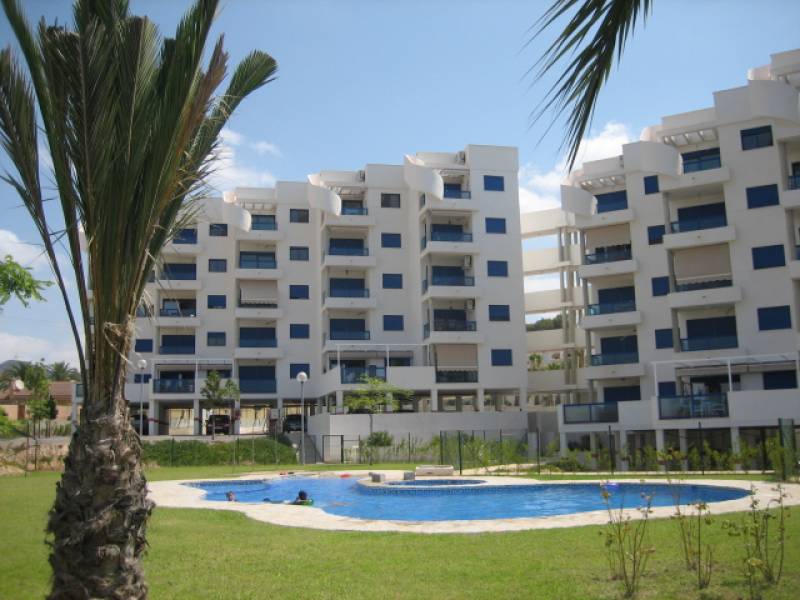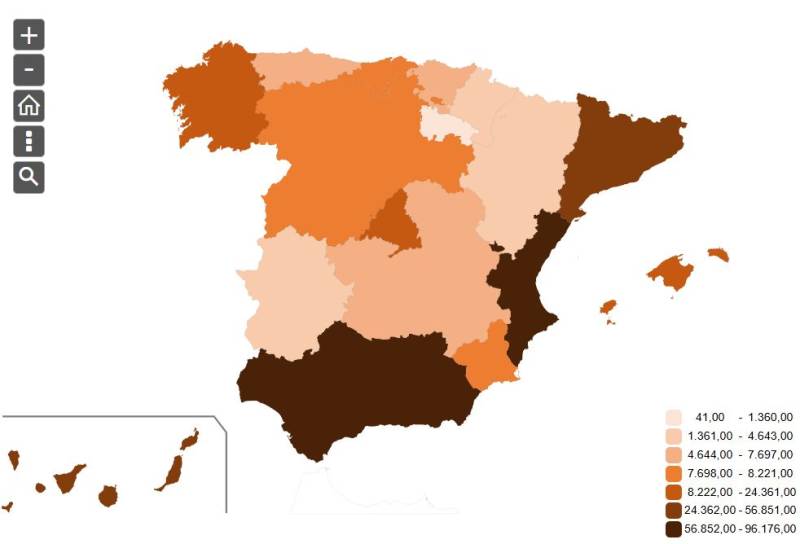- Region
- Águilas
- Alhama de Murcia
- Jumilla
- Lorca
- Los Alcázares
- Mazarrón
- San Javier
-
ALL AREAS & TOWNS
- AREAS
- SOUTH WEST
- MAR MENOR
- MURCIA CITY & CENTRAL
- NORTH & NORTH WEST
- TOWNS
- Abanilla
- Abarán
- Aguilas
- Alamillo
- Alcantarilla
- Aledo
- Alhama de Murcia
- Archena
- Balsicas
- Blanca
- Bolnuevo
- Bullas
- Cañadas del Romero
- Cabo de Palos
- Calasparra
- Camping Bolnuevo
- Campo De Ricote
- Camposol
- Canada De La Lena
- Caravaca de la Cruz
- Cartagena
- Cehegin
- Ceuti
- Cieza
- Condado de Alhama
- Corvera
- Costa Cálida
- Cuevas De Almanzora
- Cuevas de Reyllo
- El Carmoli
- El Mojon
- El Molino (Puerto Lumbreras)
- El Pareton / Cantareros
- El Raso
- El Valle Golf Resort
- Fortuna
- Fuente Alamo
- Hacienda del Alamo Golf Resort
- Hacienda Riquelme Golf Resort
- Isla Plana
- Islas Menores & Mar de Cristal
- Jumilla
- La Azohia
- La Charca
- La Manga Club
- La Manga del Mar Menor
- La Pinilla
- La Puebla
- La Torre
- La Torre Golf Resort
- La Unión
- Las Palas
- Las Ramblas
- Las Ramblas Golf
- Las Torres de Cotillas
- Leiva
- Librilla
- Lo Pagan
- Lo Santiago
- Lorca
- Lorquí
- Los Alcázares
- Los Balcones
- Los Belones
- Los Canovas
- Los Nietos
- Los Perez (Tallante)
- Los Urrutias
- Los Ventorrillos
- Mar De Cristal
- Mar Menor
- Mar Menor Golf Resort
- Mazarrón
- Mazarrón Country Club
- Molina de Segura
- Moratalla
- Mula
- Murcia City
- Murcia Property
- Pareton
- Peraleja Golf Resort
- Perin
- Pilar de la Horadada
- Pinar de Campoverde
- Pinoso
- Playa Honda
- Playa Honda / Playa Paraíso
- Pliego
- Portmán
- Pozo Estrecho
- Puerto de Mazarrón
- Puerto Lumbreras
- Puntas De Calnegre
- Region of Murcia
- Ricote
- Roda Golf Resort
- Roldan
- Roldan and Lo Ferro
- San Javier
- San Pedro del Pinatar
- Santiago de la Ribera
- Sierra Espuña
- Sucina
- Tallante
- Terrazas de la Torre Golf Resort
- Torre Pacheco
- Totana
- What's On Weekly Bulletin
- Yecla


- EDITIONS:
 Spanish News Today
Spanish News Today
 Alicante Today
Alicante Today
 Andalucia Today
Andalucia Today
article_detail
What are the pros and cons of voting to ban tourist rentals in my community?
Communities across Spain are holding EGMs to decide whether or not to continue allowing tourist rentals in their buildings, resorts and urbanisations, which has left many people wondering: “What way should I vote?”

Skip ahead to:
A new law passed in Spain gives homeowners’ associations (‘comunidades de propietarios’) the power to decide whether or not to permit new short-term tourist rentals within their communities.
This shift means that owners in apartment blocks, residential resorts and urbanisations across the country will now be able to vote on whether to allow or restrict the issuing of new tourist licences for properties in their development.
It’s worth noting that this does not affect those properties which already have a valid tourist licence, unless ownership is being transferred to a new person when the property is sold, in which case they would have to apply for a brand-new licence.
Tourist rental apartments are big business in Spain, acting as a source of income for many people, and despite the new legislation they are on the rise.
A recent study showed that two out of every three municipalities in Spain have tourist flats registered there, and in 64 towns in the country this property type accounts for more than 10% of all homes.
In May 2025, Spain exceeded 380,000 tourist flats registered, with 70% concentrated in just four autonomous communities: Andalucía, Valencia, Catalonia and the Canary Islands.

The government’s stated aim with their new legislation is to address the growing housing crisis by limiting property speculation and helping more people, especially young people and families, gain access to affordable permanent homes.
By enabling communities to control the number of holiday lets, the authorities hope to reduce the pressure on local housing markets, particularly in tourist-heavy areas.
However, the law has sparked mixed reactions, particularly in coastal areas such as Murcia, Alicante and many parts of Andalucía, where many owners are non-residents who rely on renting their homes to tourists for part of the year to help cover mortgage payments and maintenance costs.
While it is not obligatory for a community to now convene an Extraordinary General Meeting (EGM), many are choosing to do so in order to vote on the issue, and property owners are having to weigh up the arguments on both sides.
Why some owners are voting to ban tourist rentals
The issue is divisive, with people holding strong opinions on both sides, and there are good reasons both to support the ban or oppose it. Those in favour of limiting tourist rental apartments in Spain mainly focus on the conditions they live in on a day-to-day basis.
1. Improved quality of life for residents
One of the most frequently cited reasons for banning short-term holiday lets is the impact on the quality of life for full-time residents. Local communities often experience increased noise levels, late-night parties and loutish behaviour during peak tourist season, particularly when guests are not familiar with building rules or local customs. Limiting short-term stays could mean greater peace and quiet for residents and a return to more neighbourly living.
2. Less wear and tear on communal facilities
Another issue is the wear and tear on communal facilities. Frequent turnover of visitors can take its toll on lifts, swimming pools, gardens and shared spaces. Permanent residents argue that properties used as short-term rentals tend to generate more maintenance issues and that banning them will help preserve the overall condition of the development.
3. Greater security and control
Security is also a concern. A constant flow of strangers coming and going can make it harder to manage access to buildings or urbanisations, leading to worries about break-ins, theft and anti-social behaviour. By reducing the number of transient visitors, communities hope to improve safety and make it easier to hold people accountable for any damage or disturbance.
4. Stabilised property prices for locals
There is also a broader economic argument: reducing the number of tourist rentals may help stabilise or lower property prices and rental rates, making it easier for locals to stay in their towns or move out of the parental home. This is particularly relevant in cities and coastal areas where short-term letting has pushed up prices, forcing many people to look elsewhere for housing.
5. Strengthens the sense of community
Some also argue that limiting short-term lets will strengthen the social fabric of a community. In developments dominated by permanent residents, there tends to be a stronger sense of responsibility, cohesion and shared values, qualities which many say are being lost in tourist-heavy areas.
Why others are voting to allow them

On the other hand, many homeowners believe that banning tourist rentals could have unintended consequences, both for themselves and for the local economy.
1. Loss of rental income for owners
Many non-resident owners only visit their Spanish properties for a few weeks or months each year. For the rest of the time, they rent them out on a short-term basis to help cover their mortgage or justify the costs of maintaining a second home. If holiday letting is no longer an option, some say they may be forced to sell up, particularly if long-term rental is not financially viable or if they still want to enjoy some time in their property each year.
2. Impact on local businesses
Local businesses may also feel the pinch. In many tourist destinations, seasonal visitors bring vital income to bars, restaurants, shops and leisure services. Without the spending power of tourists, especially in the summer, businesses may struggle to stay afloat on the revenue generated by permanent residents alone.
3. Fewer incentives for second-home ownership and increased community fees
Some worry that fewer owners will be willing to invest in property in Spain if holiday lets are no longer permitted. This could lead to a decline in property values or result in urbanisations with a growing number of empty or underused homes. In turn, communities could see their community fees rise as fewer people contribute towards shared costs.
4. Grey market risk
There is also concern that banning short-term rentals may simply push some owners into the grey market, where they continue to rent without declaring the income or complying with local safety standards. This could create an uneven playing field and make enforcement more difficult for local authorities.
5. Unfair to part-time residents
Finally, many part-time residents feel it is unfair to restrict how they use their own property. If they maintain their homes well and follow the rules, they argue they should have the freedom to let them out legally and transparently when they are not using them.
What happens next?
Each comunidad de propietarios will eventually make its own decision on the issue, and a simple majority vote at an EGM could be enough to ban new tourist licences within a community. This happens at building level, instead of as a resort-wide rule.
Some blocks may choose to restrict short-term lets entirely, while others may allow them under certain conditions, such as limiting the number of properties that can be used for tourism, requiring minimum stays or charging additional community fees from those who wish to rent out their homes short-term.
As the law comes into effect, it is likely to reshape Spain’s property and tourism landscape, particularly in popular coastal areas. For owners, it is important to understand the implications of both sides before casting a vote as the decision could have long-term consequences for personal finances, property values and the local community.
Images: Archive/INE






